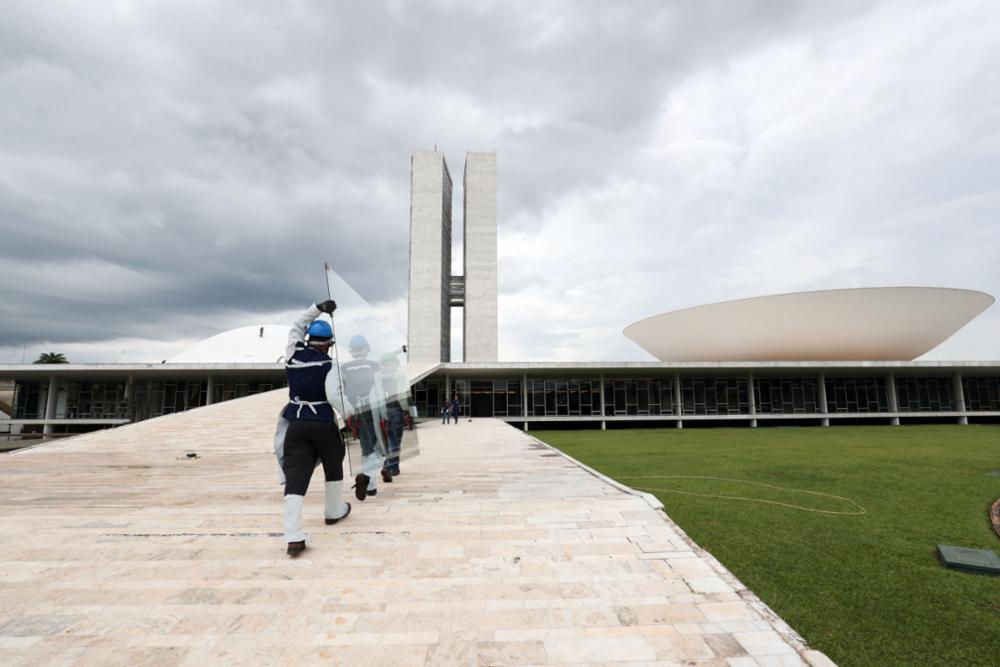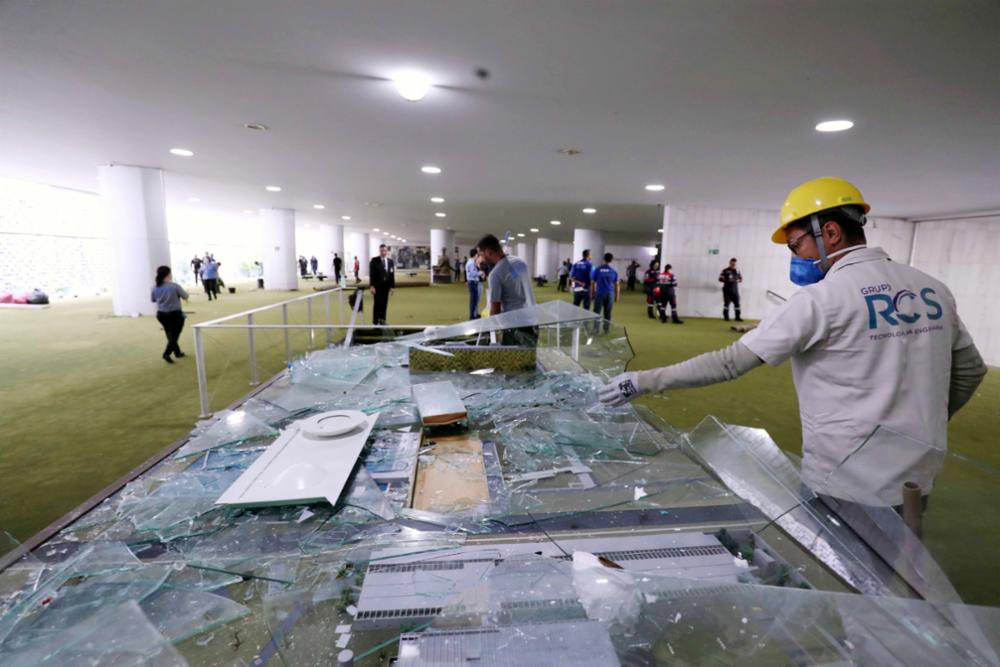
Chamber of Deputies work teams repair vandalism done by protesters at the National Congress of Brazil on 13 January. Photo: Brazil Chamber of Deputies.
Earlier this month, on 8 January, supporters of Brazil’s former president Jair Bolsonaro raided the country’s capital in an attempted coup d’etat. While most of the government was fortunately on holiday, Brasilia, their Canberra equivalent, bore witness to hundreds entering the Supreme Court, National Congress, and Presidential Palace in a direct attack on Brazil’s democracy. Region spoke with a few members of the Brazilian community here in the ACT to understand some of the historical context and how they find Australia.
Bolsonaro, a former military officer who served three years as president of Brazil from 2019 to last year, led the large South American country on a platform of extremism, polarisation and misinformation.
“He’s part of a group of people that believe the military should take more power from the government, such that they don’t have to answer to the president,” says a Brazilian woman who moved to Australia five years ago but wishes to remain anonymous.
“Some people in the country have the same beliefs as him. They are very extremist and blame everything on Lula, but it’s not just him, it is more about the corruption, which is really bad in Brazil.”
Current President Luiz Inacio Lula da Silva (Lula), a member of the country’s Worker’s Party (PT), served in the position before, from 2003 to 2010. While a popular leader who is credited with assisting Brazil off of the UN’s Hunger map, he has also been implicated in a number of scandals and in 2017 was convicted of corruption and money laundering, for which he served 580 days in jail.
“It doesn’t matter which part of the country you’re in, corruption is the root of the politician in Brazil,” adds the anonymous Brazilian woman.
“When Bolsonaro was running his campaign in 2018, many people did not agree with the military taking over, but on the other hand, he was offering lots of good changes for Brazil.
“So people tended to vote for him more because he was a new face. However, as soon as he took over, he started showing his true face.”

Hundreds of Bolsonaro supporters broke into and vandalised the Brazilian National Congress. Work teams are pictured on 11 January repairing glass displays that were smashed. Photo: Brazil Chamber of Deputies.
Following Lula’s first term, his chief of staff Dilma Rousseff took on the job and led Brazil until her impeachment in 2016. The multibillion-dollar Petrobas scandal implicated her and led to millions of people protesting in the streets as the country was experiencing a crippling economic crisis.
“I remember I was in Avenida Paulista working, which is one of the main streets of Sao Paulo. They had these strikes that would close everything, where protesters would ask everyone to join them or go home, otherwise they would vandalise it all.
“I used to joke that the only way that Brazil would be better was if someone went to Brasilia and destroyed everything. Now I’m like, ‘Oh my gosh, that is not the solution’.
“I think the big thing that got them to this point is fake news, which is spreading across the country.”
Daiana Seabra, who came to Australia early last year for her PhD, agrees with this sentiment. She says the message of corruption in former governments on social media has been manipulated by Bolsonaro and his supporters to prevent any investigation of the corrupt practices he’s involved with.
One such incident involved the Chief of Federal Police being changed multiple times to halt anyone investigating Bolsonaro and his son.

Daiana Seabra is doing her PhD in law of the sea at UNSW’s Canberra campus. Photo: Daiana Seabra.
Daiana believes a key reason Bolsonaro was able to guide public opinion so successfully is that the country never received closure on its history.
From 1964 to 1985, Brazil was under military dictatorship, which had an amnesty law established in 1979 to protect trade unionists and young political activists. The unfortunate by-product of this was that no crimes inflicted by the government at that time have been investigated or prosecuted, such that many are unaware of the horrors of that period.
“We have an ongoing problem of these people who claim that those times were better because they don’t understand what happened,” she says.
“In recent years I’ve seen a constant attack on the educational system, especially professors, who are often accused of indoctrinating kids to be leftist.
“I know that very well because I was teaching at a law school and had to watch my words constantly, which is not what education should be about.
“If there is something to learn here, I would say that no democracy can believe it won’t happen to them.”

JP with his two cousins over the holidays. Photo: Maria Fernanda Gomes.
Joao Pedro Gomes (JP) came to Australia from Sao Paulo in 2019 when he was 18 years old. Originally just visiting family in Canberra, he decided to stay after seeing how beautiful the city was on a bus ride.
He decided to not pursue university due to how expensive it was in Brazil, instead wanting to learn English. Now he is considering the idea of raising a family here, which he said was not his plan back home.
“Brazil has a lot of people so there’s not many opportunities and I feel like everyone tries to take advantage of you. They see it as being smarter and a good thing, which is very manipulative.
“When Bolsonaro got voted in, I was devastated. My history teacher taught me about the crimes during the dictatorship, which my parents’ generation never did.
“I saw those same old faces being brought by him [Bolsonaro] into government, which is why I didn’t want to stay there.”
Asked whether he’d move home to Brazil in the future, JP said no.
“I remember hearing someone here complain about how much taxes they’re paying, and I was like, but things work here. From my point of view, I see Canberra growing and always evolving, but in Brazil, nothing gets fixed and no one cares.”
On the state of politics in Australia, the anonymous Brazilian woman says: “Nothing I’ve experienced over here is as bad as over there. When I see people protesting here, I just think, ‘That’s so cute’.”












